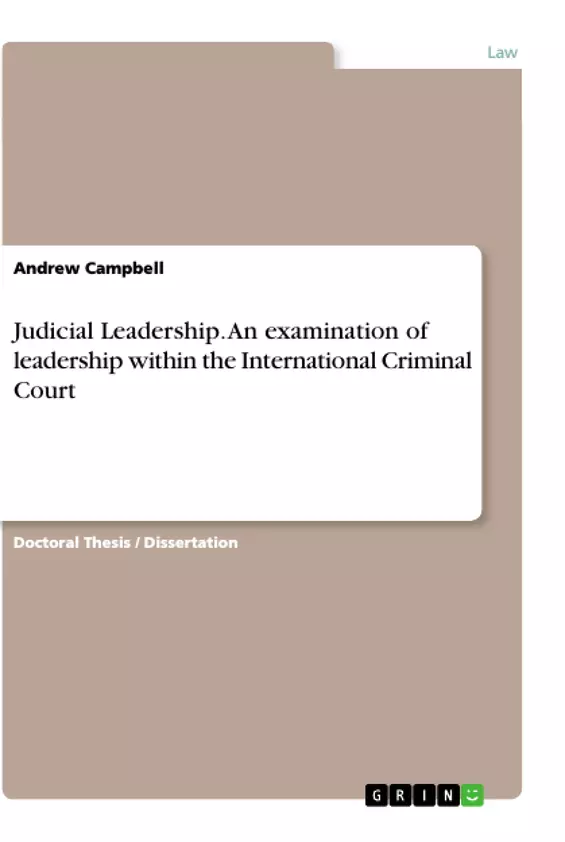This research conducts an exploratory study of the individual leadership competences of judicial actors comprised of the Presidency of the Court, Office of the Prosecutor, and Registry and its support staff within the International Criminal Court (ICC) located at The Hague, Netherlands.
The research objectives of this study are not only to identify leadership competencies of current and former president of the court, office of the prosecutor, and registry or court administrator and their support staff but also to generate a body of knowledge that explores judicial actors as leaders within the national and international judicial systems.
By developing a conceptual roadmap this study benefits the international community by creating a body of knowledge that bridges the disciplines of leadership and judicial processes that addresses the emerging complexity and global significance of transitional justice in post conflict environments.
This study lays the foundation for transitional justice scholar-practitioners to determine the role leadership traits and competencies play within the international judicial community to prosecute human rights violations, protect victims from further human rights violations, and sustain the rule of law in a post conflict environment.
The aim of this study is to advance knowledge in the field of global leadership by introducing the application of institutional and organizational leadership competences into the discipline of International Law. Also, to generate new knowledge of the critical role that individual leadership traits and competencies play as transitional justice practitioners seek to achieve national reconciliation in a post conflict environment. In other words, this study will make a significant contribution to the fields of leadership and international justice by understanding the role that individual leadership traits play within the ICC as transitional justice theorists seek to understand and develop legitimate legal capacities in a post conflict environment.
Inhaltsverzeichnis (Table of Contents)
- Chapter 1: Introduction
- A. Introduction
- B. Problem Statement
- C. Purpose of the Study
- D. Research Questions
- E. Theoretical Framework
- F. Leadership
- G. Justice and International Criminal Justice
- H. The International Criminal Court (ICC)
- I. Key Concepts
- J. Definition of Terms
- K. Organization of the Dissertation
- Chapter 2: Literature Review
- A. Introduction
- B. Leadership
- C. Judicial Leadership
- D. International Criminal Justice
- E. The International Criminal Court (ICC)
- F. Leadership within the ICC
- G. Research Gaps
- H. Summary
- Chapter 3: Methodology
- A. Introduction
- B. Research Approach
- C. Research Design
- D. Data Collection
- E. Data Analysis
- F. Validity and Reliability
- G. Ethical Considerations
- H. Summary
- Chapter 4: Findings and Analysis
- A. Introduction
- B. Leadership Styles of the President of the ICC
- C. Leadership Practices of the President of the ICC
- D. Leadership Theories and Practices
- E. Summary
- Chapter 5: Discussion and Conclusion
- A. Introduction
- B. Discussion
- C. Recommendations
- D. Limitations
- E. Conclusion
- F. Future Research
Zielsetzung und Themenschwerpunkte (Objectives and Key Themes)
This dissertation examines leadership within the International Criminal Court (ICC) through a case study of the President of the ICC. It investigates leadership styles, practices, and their impact on the institution's effectiveness and legitimacy. The study aims to contribute to the understanding of judicial leadership in a global context, highlighting its unique challenges and opportunities.
- Judicial leadership in international institutions
- Leadership styles and practices of the ICC President
- The impact of leadership on the ICC's effectiveness and legitimacy
- The challenges and opportunities of judicial leadership in a globalized world
- The role of the ICC in promoting justice and accountability
Zusammenfassung der Kapitel (Chapter Summaries)
Chapter 1 introduces the dissertation's objectives, research questions, and theoretical framework. It provides a background on leadership, international criminal justice, the ICC, and key concepts relevant to the study. Chapter 2 reviews existing literature on leadership, judicial leadership, international criminal justice, and the ICC, identifying research gaps that the dissertation seeks to address. Chapter 3 outlines the dissertation's methodology, including the research approach, design, data collection methods, and ethical considerations. Chapter 4 presents and analyzes findings from the case study, examining the leadership styles, practices, and their impact on the ICC's effectiveness and legitimacy.
Schlüsselwörter (Keywords)
The dissertation explores key themes of judicial leadership, international criminal justice, the International Criminal Court (ICC), leadership styles and practices, institutional effectiveness, legitimacy, and global governance. These concepts are examined through the lens of the ICC President's leadership, providing insights into the complexities of leading a global institution tasked with delivering justice for international crimes.
Frequently Asked Questions
What is the main objective of the ICC leadership study?
The study aims to identify leadership competencies within the International Criminal Court (ICC) and explore how judicial actors act as leaders in international systems.
Which specific roles within the ICC are examined?
The research focuses on the Presidency of the Court, the Office of the Prosecutor, and the Registry (including support staff).
What is "Judicial Leadership" in this context?
It refers to the application of institutional and organizational leadership traits by judicial practitioners to ensure the effectiveness and legitimacy of international law.
How does leadership impact transitional justice?
Individual leadership traits and competencies are critical for achieving national reconciliation, prosecuting human rights violations, and sustaining the rule of law in post-conflict environments.
What is the "conceptual roadmap" developed in this study?
It is a framework that bridges the disciplines of leadership and judicial processes to address global complexities in international justice.
- Arbeit zitieren
- Andrew Campbell (Autor:in), 2016, Judicial Leadership. An examination of leadership within the International Criminal Court, München, GRIN Verlag, https://www.grin.com/document/903986



